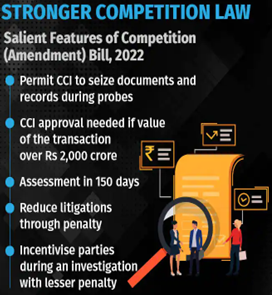Why in News?
- The Lok Sabha recently cleared the Competition (Amendment) Bill, 2022.
- The Bill aims at bringing in greater regulation - particularly for Big Tech firms - by introducing deal value threshold for approvals by the Competition Commission of India (CCI) and enabling cartels to avail of the CCI’s settlement mechanism.
What’s in Today’s Article?
- What is the Competition (Amendment) Bill, 2022?
- What are the Key Features of the 2022 Bill?
- News Summary Regarding the Bill Cleared by the Lok Sabha
What is the Competition (Amendment) Bill, 2022?
- It was introduced by the Ministry of Finance to amend the Competition Act, 2002 to bring it in line with modern development of new technology, digital market.
- The 2002 Act establishes the Competition Commission of India (CCI) for regulating market competition.
- Later, the Bill was referred to the Parliamentary Standing Committee on Finance for further scrutiny.
What are the Key Features of the 2022 Bill?

- Expansion of scope of the combinations (mergers, acquisitions, or amalgamation of enterprises) to include transactions with a value above Rs. 2000 crores (from Rs. 2000 crores earlier).
- Reduction in the time period for approval of combinations from 210 days to 150 days.
- Modification in the definition of control for the purpose of classification of combinations.
- The Bill modifies the definition of control as the ability to exercise material influence over the management, affairs or strategic commercial decisions.
- Expansion of the scope of Anti-competitive agreements.
- Under the Act, anti-competitive agreements include any agreement related to production, supply, storage or control of goods/services, which can cause an appreciable adverse effect on competition in India.
- The Bill adds that enterprises or persons not engaged in identical or similar businesses shall be presumed to be part of such agreements.
- Settlement and Commitment in anti-competitive proceedings.
- The Bill permits CCI to close inquiry proceedings if the enterprise offers - settlement (may involve payment), commitments (may be structural or behavioural in nature).
- The manner and implementation of settlement and commitment may be specified by CCI through regulations.
- More scrutiny on Big Tech giants:
- As per the Bill, CCI members have to be qualified in the field of technology to add investigative strength and professional knowledge of the regulator.
- The Bill also seeks to introduce knowledge and experience in the field of technology as additional criteria for the members of the selection committee.
News Summary Regarding the Bill Cleared by the Lok Sabha:
- A major change in the Bill (that awaits the Rajya Sabha’s nod) is the provision relating to penalties that the competition watchdog (CCI) can levy.
- Presently, the CCI can impose a penalty of up to 10% of a company’s average turnover in the “relevant market.”
- Now, the phrase “turnover” will refer to the “global turnover derived from all the products and services by a person or an enterprise”.
- According to the experts, this is a highly contentious provision that will result in higher penalties for global multi-product companies.
- The introduction of deal value thresholds will bring transactions involving ‘asset lite’ and ‘low revenue’ companies (which were previously not notifiable) under the CCI’s scrutiny.
- Moreover, the settlements and commitments mechanism will
- Ensure swift correction of anti-competitive behaviour and practices in the market and
- Spare willing and legally compliant companies to face the rigours of an extensive investigation.
- The actual implementation of these changes will hinge on the regulations that the CCI will issue, following the Bill’s enactment.









